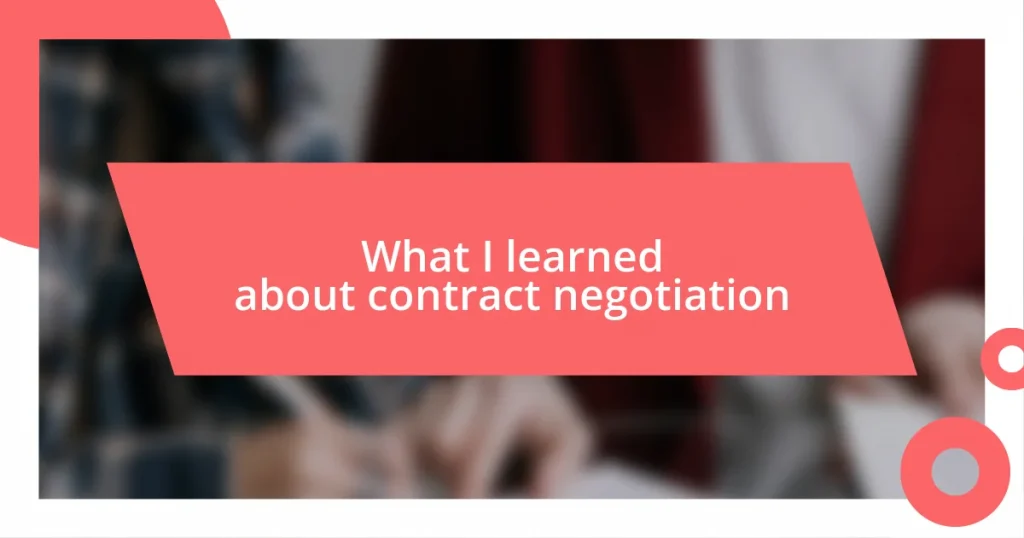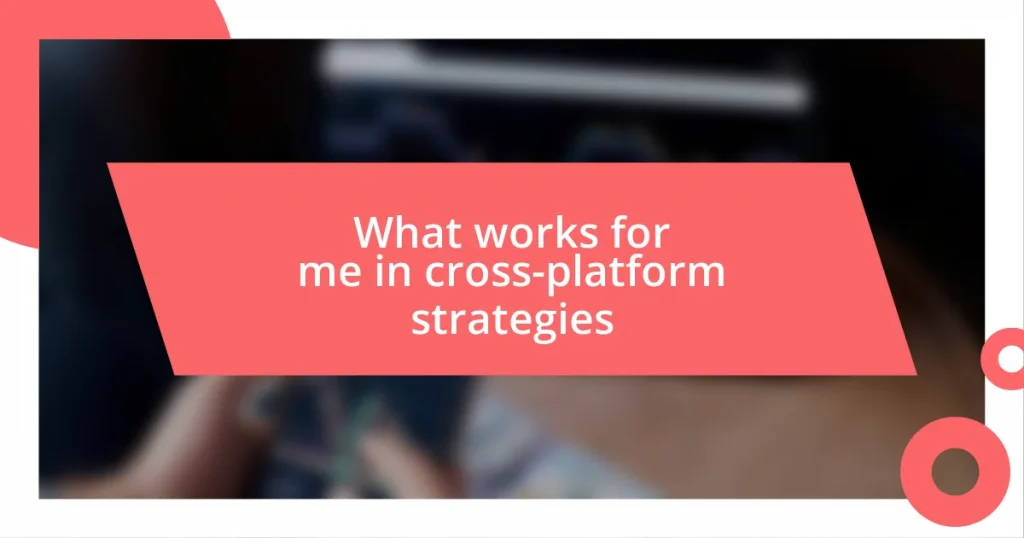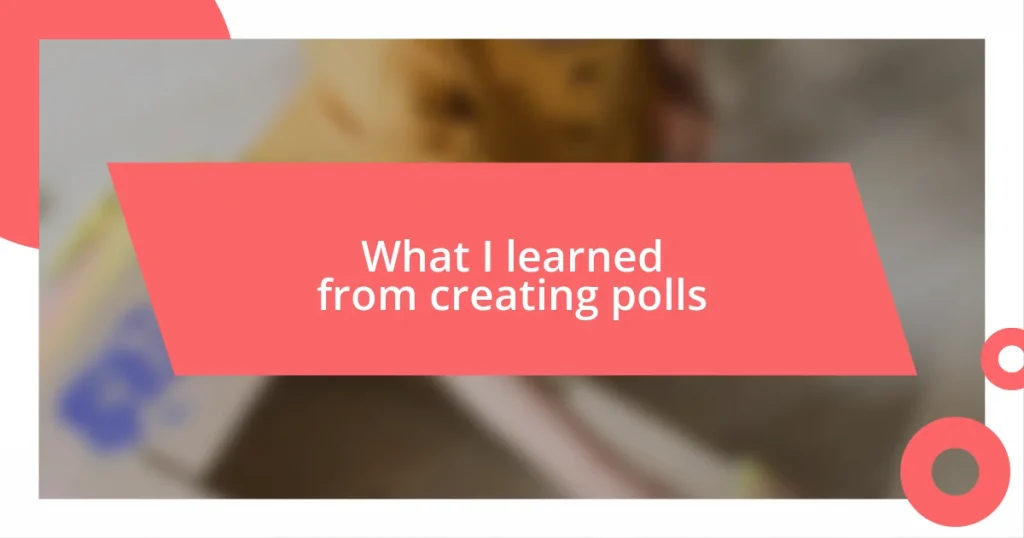Key takeaways:
- Preparation is essential, including understanding objectives, active listening, and practicing scenarios to enhance confidence.
- Including diverse participants fosters collaboration and innovation, resulting in more effective negotiations.
- Effective closing involves summarizing agreements, confirming next steps, and expressing gratitude to strengthen relationships.
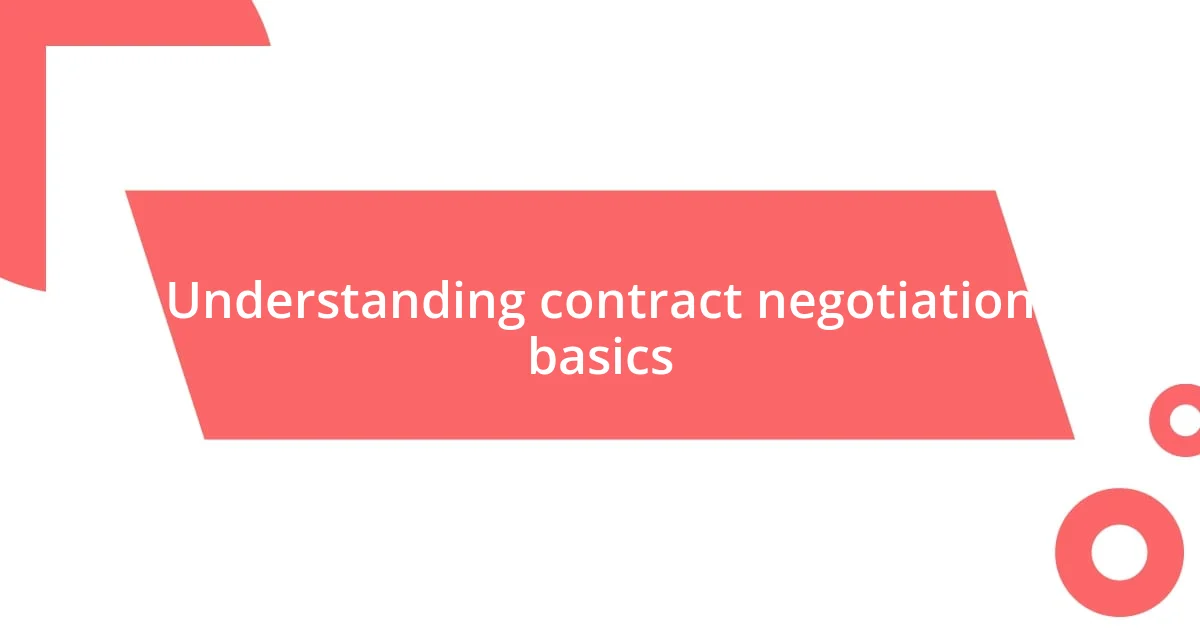
Understanding contract negotiation basics
Understanding the basics of contract negotiation is crucial for anyone involved in business agreements. I remember my first negotiation—sitting across the table, I felt a mix of excitement and anxiety. This moment taught me that preparation is key. Understanding the terms and having a clear goal can significantly influence outcomes.
Let’s face it: misunderstandings can easily derail even the best negotiations. Have you ever asked yourself why it’s important to be clear about your objectives? From my experience, being upfront about what you want helps establish a foundation of trust and openness. It also ensures that both parties are on the same page, which minimizes potential conflicts later on.
One fundamental element I learned over time is the importance of active listening. Early in my career, I tended to focus solely on what I wanted to say next. However, when I started really paying attention to the other party’s concerns, it opened up a dialogue that led to more favorable agreements. Isn’t it interesting how understanding others can often lead to your own success?
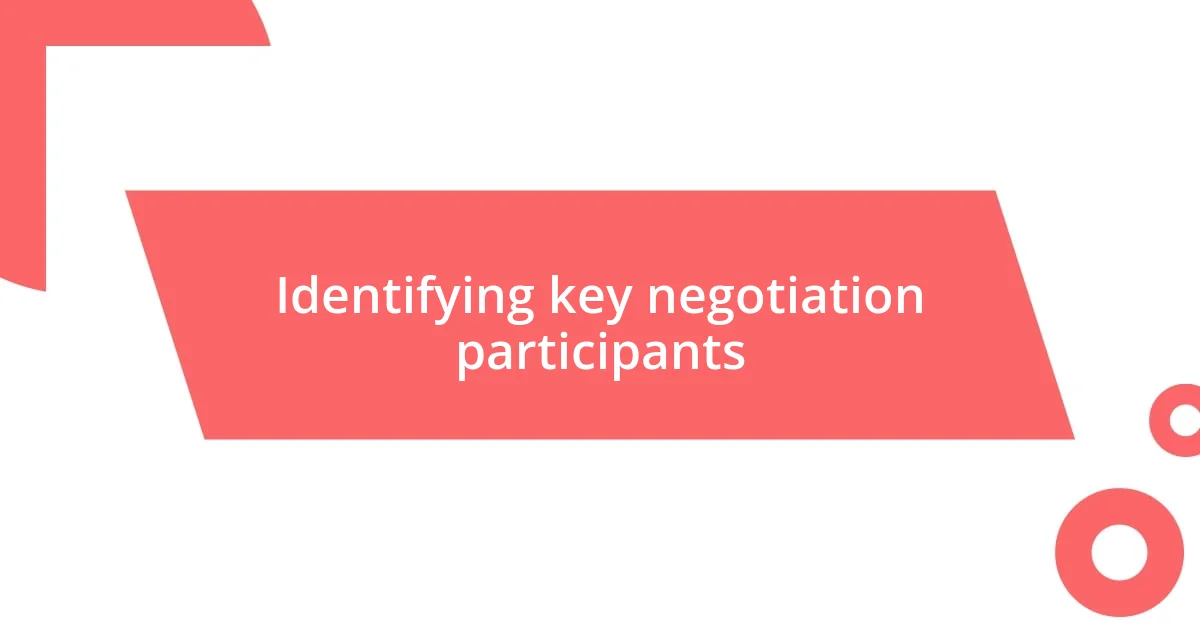
Identifying key negotiation participants
Identifying the right participants in a contract negotiation is critical. The stakeholders involved will shape the direction and outcome of the discussions. During one memorable negotiation, I struggled to pinpoint who should be at the table. It felt like a jigsaw puzzle—each piece representing a different viewpoint and interest. Including the right participants made all the difference, as their insights enriched our discussions and led to a more robust agreement.
Here are the key negotiation participants to consider:
- Decision-Makers: Those with the authority to approve or reject proposals.
- Legal Advisors: Experts who can articulate the legal implications of the contract terms.
- Financial Analysts: Individuals who assess the financial viability of the agreement.
- Subject Matter Experts: Professionals with specific knowledge relevant to the negotiation.
- Stakeholders: Anyone affected by the contract, whose insights can provide valuable context.
Reflecting on my experiences, I’ve learned that the more diverse the representation, the richer the negotiation becomes. It’s intriguing how collaboration can unlock creative solutions that might not have surfaced otherwise.
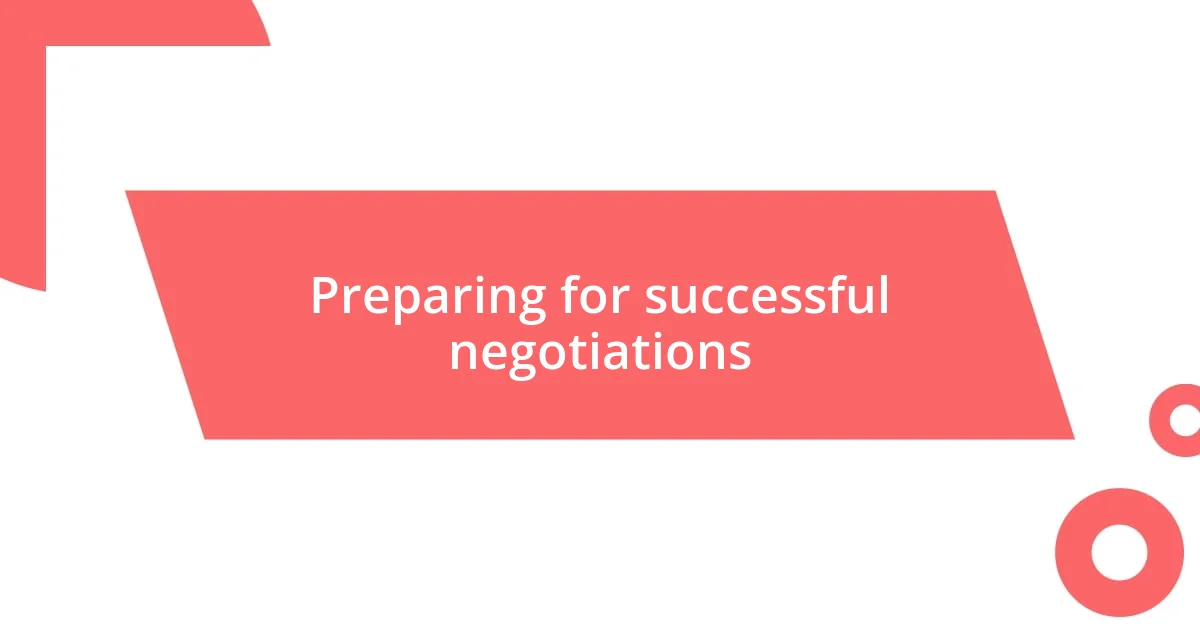
Preparing for successful negotiations
Preparing for successful negotiations requires a blend of strategic planning and emotional intelligence. I recall a time when I meticulously prepared for a negotiation, delving into the interests and pain points of the other party. This preparatory work not only equipped me with valuable insights but also put me in a position of empathy. When I began the discussion, I felt a connection that made the negotiation feel less like a battle and more like a collaborative effort.
Another crucial aspect is setting a realistic timeline. I’ve learned the hard way that rushing a negotiation can lead to poor decisions and overlooked details. During one high-stakes negotiation, we lost a week to last-minute changes because we hadn’t allocated enough time for each stage of the process. Establishing a clear timeline provides structure and allows for necessary adjustments, ultimately paving the way for a more effective negotiation journey.
Lastly, practicing negotiation scenarios can significantly boost confidence. I remember role-playing different outcomes with a mentor before a big negotiation, and it was eye-opening. By envisioning various scenarios and practicing responses, I walked into the actual negotiation prepared for anything. Isn’t it fascinating how a little rehearsal can transform fear into confidence and clarity?
| Preparation Aspect | Importance |
|---|---|
| Understanding Interests | Fosters empathy and collaboration |
| Setting Timelines | Allows for thorough discussions and adjustments |
| Practicing Scenarios | Builds confidence and readiness |
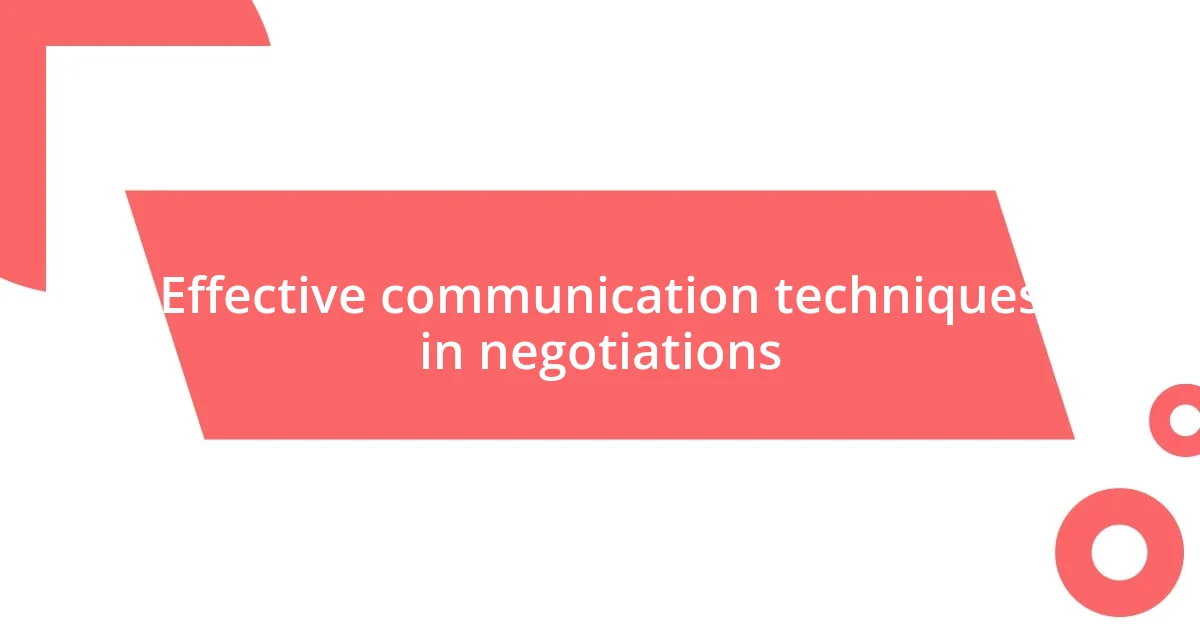
Effective communication techniques in negotiations
Effective communication is fundamental in negotiations, and I’ve found that active listening plays a pivotal role. During a complex negotiation, I once realized how powerful it was to genuinely hear the other party’s concerns. By asking clarifying questions and reflecting back what they said, I built trust and rapport. It’s amazing how acknowledging someone’s perspective can shift the conversation away from conflict and toward understanding.
Non-verbal cues also deserve attention. I vividly remember a negotiation where I noticed the other party’s crossed arms and furrowed brows. I quickly adapted my approach, softening my tone and using open body language to signal that I was there to collaborate, not compete. It’s fascinating how much can be conveyed without words—sometimes a smile can speak volumes!
Lastly, clarity in communication cannot be overstated. I learned this firsthand when I used clear, concise language to outline my proposals. In a past negotiation, I took the time to break down complex terms, ensuring everyone was on the same page. This not only minimized misunderstandings but also created an environment where creativity could flourish. Have you ever felt the weight lift when things were explained simply? I’ve experienced that relief, and it opens doors to innovative solutions.
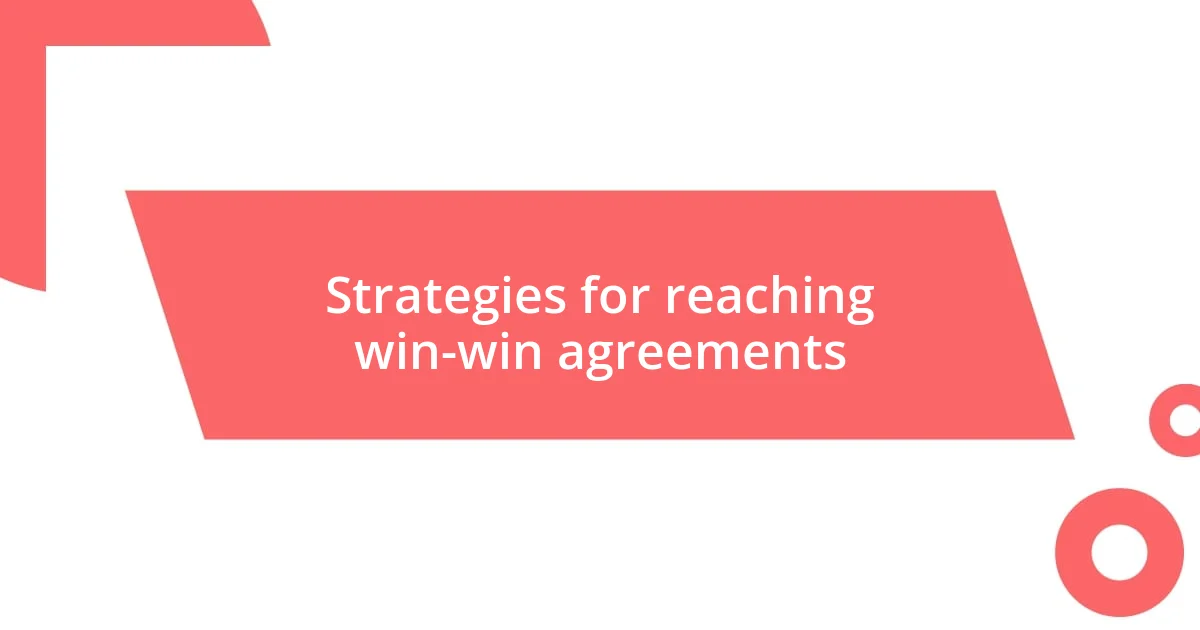
Strategies for reaching win-win agreements
Finding strategies that lead to win-win agreements is essential for mutually beneficial outcomes. In my experience, one effective strategy is to brainstorm options together before jumping into hard negotiations. I vividly recall a meeting where both parties were stuck on a sticking point. Instead of arguing over terms, we shifted the focus to a whiteboard session, where we generated multiple solutions. This collaborative approach not only sparked creativity but also revealed shared interests people often overlook. What if we all took a little time to open the floor for ideas rather than just negotiation points?
Another strategy relies on reframing the conversation to emphasize joint goals. I remember a negotiation where the initial goal was framed too narrowly, leading to frustration on both sides. By rephrasing our aim to achieve value for our customers, the mood shifted dramatically. We left the negotiation with not just a contract, but a commitment to a partnership. Isn’t it intriguing how perspective can change the dynamic from adversarial to cooperative?
In navigating these negotiations, being transparent about your limits can cultivate trust. I still recall when I faced a tough negotiation where I laid out my non-negotiable points upfront. This honesty encouraged the other party to share their boundaries too. The resulting discussions felt more like collaboration than a battle of wills. Have you ever wished someone would just lay their cards on the table? This openness can truly pave the way for creative solutions and respected agreements.
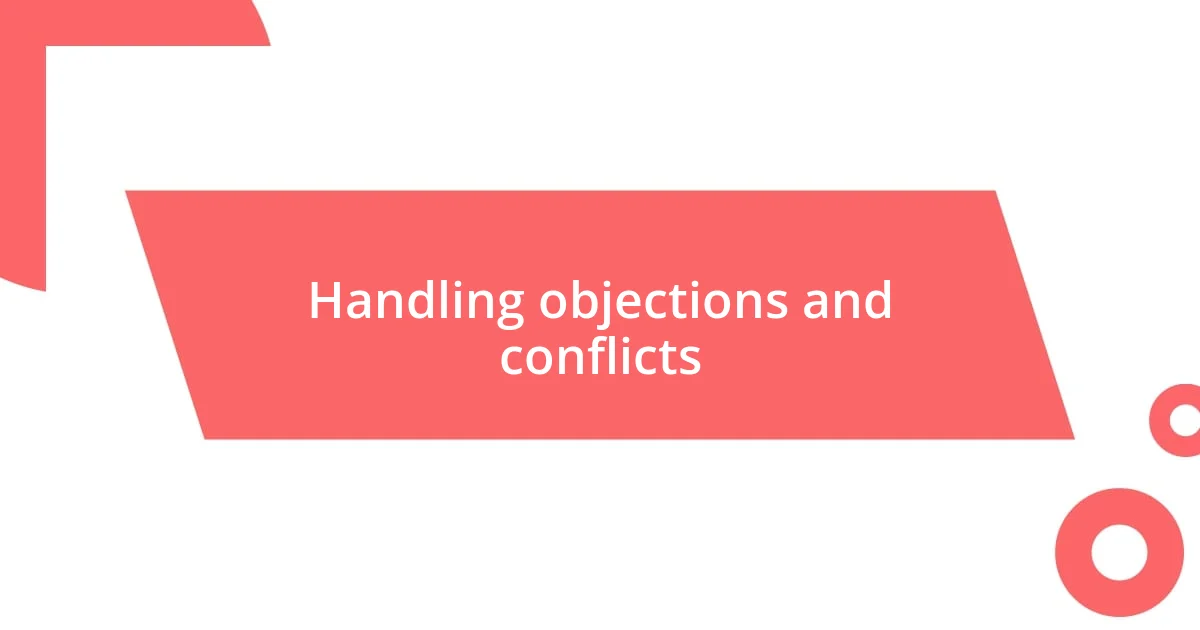
Handling objections and conflicts
Handling objections and conflicts can often feel like walking a tightrope. I remember a situation where a client raised significant concerns about pricing mid-negotiation. Instead of getting defensive, I took a breath and acknowledged their worries. By validating their feelings and showing empathy, I created an opening for a more constructive dialogue. After all, when was the last time you felt heard in a disagreement?
It’s crucial to remain calm and centered when conflicts arise. There was an instance where a sudden disagreement over terms escalated quickly. Instead of letting my frustration take the lead, I paused, allowing the tension to settle before proceeding. I suggested a break to gather our thoughts. This simple step not only diffused the situation but also provided space for both parties to reconvene with a fresh perspective. Can you recall a moment when stepping away led to better clarity?
Moreover, I’ve learned that focusing on the issue, not the person, is key in resolving conflicts. During a particularly heated negotiation, I found it beneficial to reiterate that we were both working toward the same goal. This mindset transformed the atmosphere from adversarial to collaborative. Reflecting on past experiences, I ask myself: how often do we let personal feelings cloud our professional judgments? Keeping the conversation centered on shared objectives can significantly ease tensions.
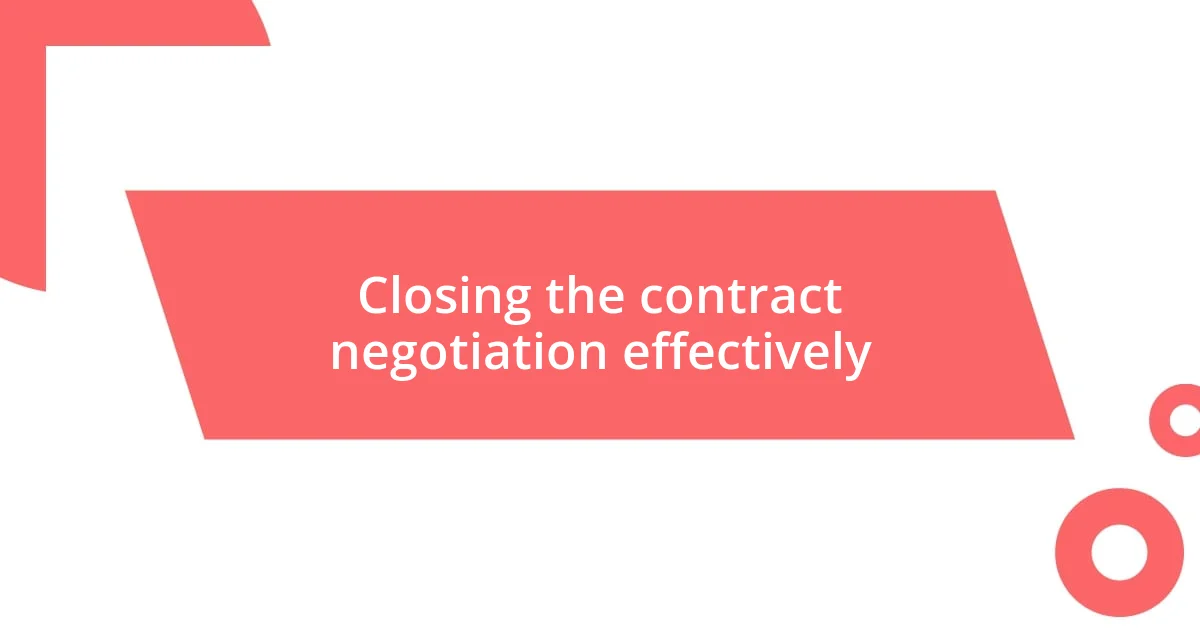
Closing the contract negotiation effectively
Closing the contract negotiation effectively often hinges on how you summarize what’s been agreed upon. In one memorable instance, after a long day of discussions, I took a moment to outline each point we had addressed. This not only reinforced our shared understanding but also built momentum toward signing. Have you ever noticed how clarifying points at the finish line can create a sense of accomplishment? It’s like tying up a beautiful gift with a ribbon.
Another key aspect that can’t be overlooked is confirming the next steps. I recall wrapping up a particularly complex contract and feeling the excitement in the room when I asked everyone to outline what we’d do next. The energy shifted instantly; it reassured everyone that we were moving towards implementation rather than simply closing a deal. Isn’t it fascinating how a clear direction can transform uncertainty into enthusiasm?
Lastly, expressing gratitude is a powerful tool in closing negotiations. After finalizing a contract, I always take the time to thank each party involved. I remember how a simple thank you after a tough negotiation left a lasting impression and opened doors for future collaborations. Have you considered how gratitude can soften even the hardest of agreements? It’s amazing how something so small can nurture relationships for years to come.










